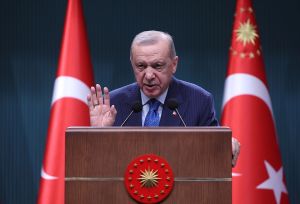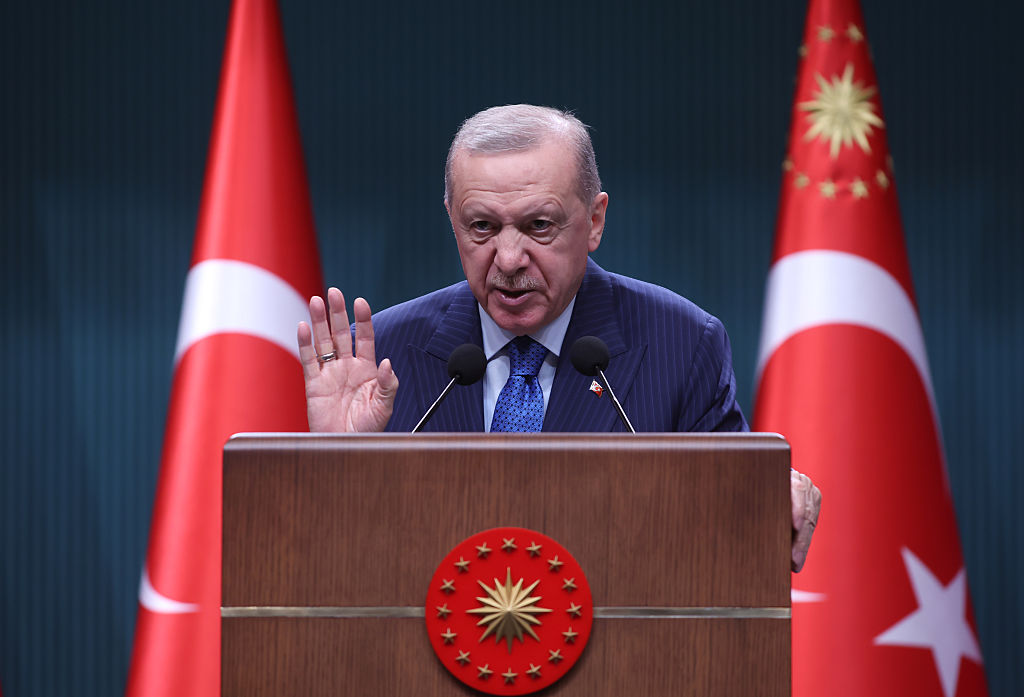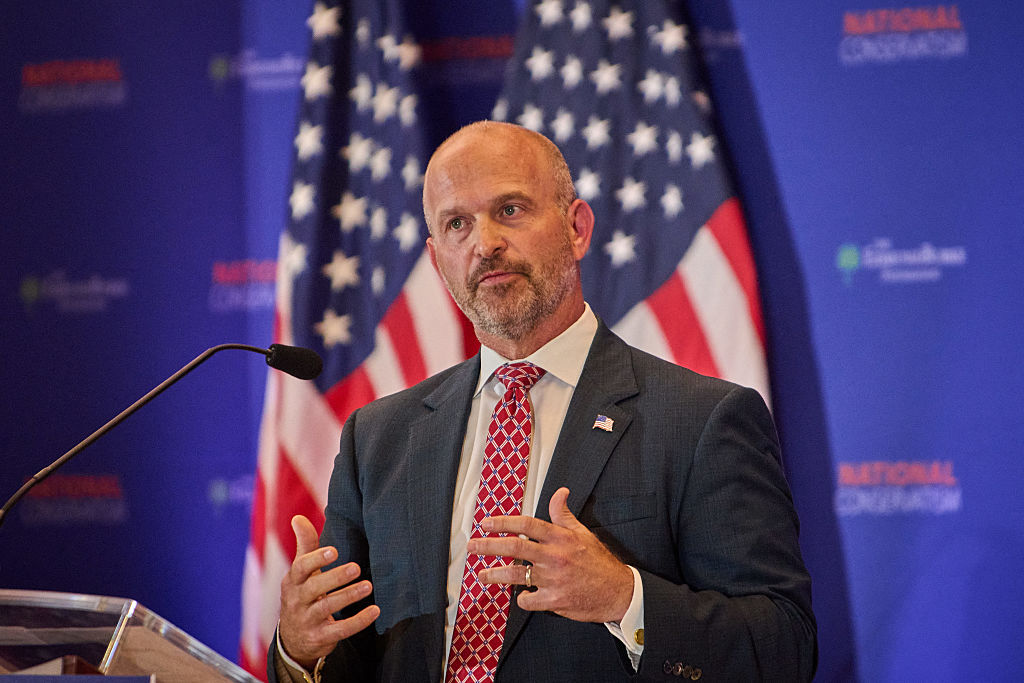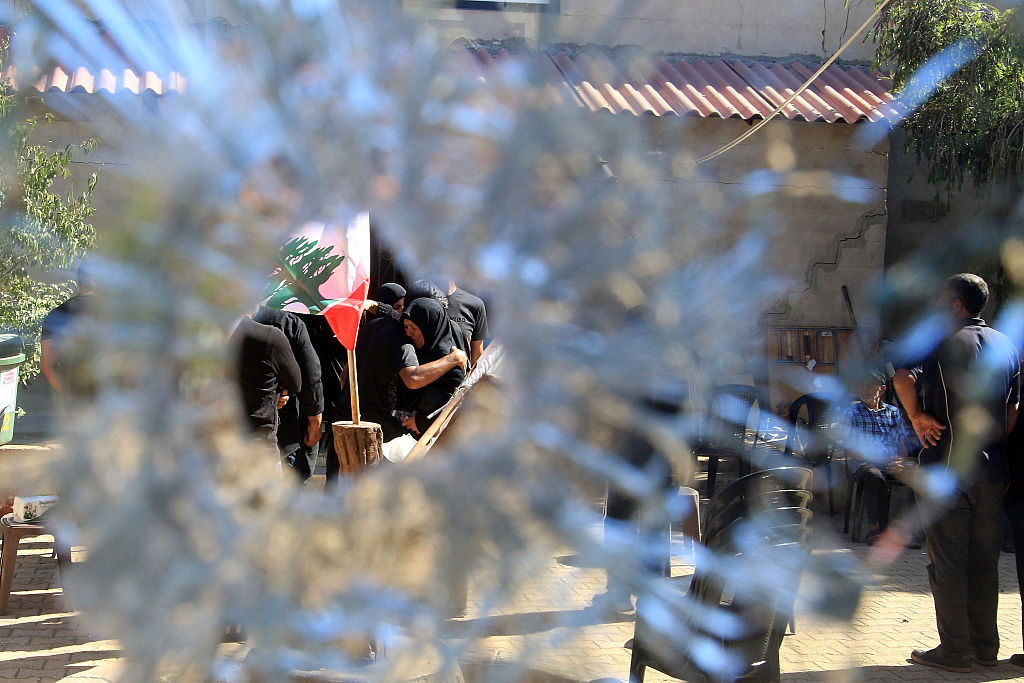Jared Kushner’s two-day ‘Peace to Prosperity’ workshop in Bahrain, the administration claims, was the first step in resolving the Israeli-Palestinian conflict. Neither the Israelis nor the Palestinians sent delegations. The roll-out of the strategy paper that preceded it was met with near silence. America’s regional partners provided only lukewarm support to Kushner’s efforts and, not least, the workshop was amateurishly misnamed. Kushner believes it’s actually ‘prosperity to peace’ — not the other way around.
The workshop’s results, or lack of them, were predictable. But criticism among those who have been down this road before has been muted, partly because of Kushner’s quiet but focused effort to solicit their views.
‘Listen, I hope he succeeds, I really do,’ Aaron David Miller, a Distinguished Fellow at the Wilson Center and former senior adviser for Arab-Israeli negotiations to the State Department, says. ‘And if he does, I’ll be the first one to applaud.’
An anonymous colleague of Miller’s, fearful of being tarred by supporting what he calls a ‘pro-Trump effort’, agrees: ‘Why not support him? After all, we’ve done worse. And you never know, this just might work.’
Perhaps, but Middle East veterans remain deeply skeptical about the Kushner plan, primarily because its focus on building the Palestinian economy — to the tune of $50 billion in funding — is a kind of down payment on a yet-to-be-announced political program. That seems a triumph of hope over history.
In effect, Kushner’s wager is that having staked billions on shaping a ‘thriving and integrated economy’, the Palestinian recipients of the largesse will be loath to blow it up — that good roads, high speed rail and a Starbucks or two will make being occupied by your enemy acceptable.
The problem is that that has never, ever been true. Similar plans in previous eras have ignominiously failed to deliver the political goods. The most recent evidence for this came in 2000, when the Second Intifada broke out in the West Bank and Gaza. Over the next two years, the miraculous investment-fueled GDP increase in the Palestinian territories that followed the September 1993 handshake between Yitzhak Rabin and Yasser Arafat on the White House lawn was upended by a relentless bloodletting. 3,000 Palestinians and 1,000 Israelis were killed. The economic prosperity in the Palestinian territories, built on tens of billions of dollars of international funding, was shattered.
The lesson seems simple enough. If you want to end the Israeli-Palestinian conflict, you begin with the toughest part, the political part, and then focus on prosperity. In that order. The problem is that this too has been tried before, and has just as spectacularly failed.
Israelis and Palestinians, and the United States too, have been searching for a political solution for the better part of four decades. They have never found one — and for good reason. Despite the rise of a handful of dissenting voices, we remain an Israel-intoxicated country. All past negotiations on the conflict have reflected this.
Israel, we aver, is ‘the only democracy in the Middle East (it’s not). It ‘shares our values (cleverly, we never say what those are), is a part of our Judeo-Christian heritage (a phrase that is never uttered in, say, Israel), and is a modern David facing off against a terrorist Goliath — a claim so laughable that it has now been dropped from polite discourse. The truth is that we’ve worked for peace between the Israelis and Palestinians because we fear that without it Israel is finished. We might be right.
If the brutality, anguish, vertigo and hubris of the Second Intifada proved anything, it is that that oldest of American delusions, that violence never works, is a lie. Of course it works. It works especially well for those fighting to be heard. In the months leading up to the April 2002 Battle of Jenin (where the IDF’s elite Golani Brigade faced off against a Palestinian militia in the warrens of the Jenin refugee camp), the Israeli expropriation of Palestinian land had ceased — an outcome never achieved through decades of US-sponsored talks. Jenin’s butcher’s bill (52 dead Palestinians, 23 dead Israelis), shocked Israel, but was extolled by the Palestinians, who scrawled Arabic graffiti on their booby traps: ‘Pack your bags, Yossi, you’re leaving.’
So, what should we do? After years of thinking about and witnessing this conflict (which included some 30-plus visits to Israel, the West Bank and Gaza over a period of 25 years), it’s clear that what’s needed is a clear-eyed rejection of the naïve beliefs, the political fables, on which our hopes for the future of Israel are built.
The first fable is that the Israelis and Palestinians yearn for peace as much as we do. They don’t. I am often asked by friends and neighbors, those with only a glancing sense of the disagreements involved, why the Israelis and Palestinians are so wedded to their conflict. When I was younger, I would go into great detail about the history of the dispute, an explanation that would be greeted with knowing nods and feigned interest. No more. Why can’t the Israelis and Palestinians agree on peace? ‘Because they hate each other,’ I say, and leave it at that.
I began to form this simplest of all observations in late 1993, when I was asked to introduce then-Prime Minister Yitzhak Rabin to an audience of Arab journalists. Rabin, I said, was a warrior who had become a man of peace — a national leader willing to end his country’s conflict with the Palestinians by appearing alongside his old nemesis, Yasser Arafat. But my introduction fell flat, especially with Rabin. He was irritated by my words, and after his presentation, he told me why:
‘I appreciate your sentiment,’ he said, ‘but you’re wrong. I am not a man of peace. I am an Israeli patriot. If meeting with a Palestinian will help Israel, I will do that. If fighting the Palestinians will help Israel, well I will do that. Do you understand? I will do whatever it takes to help Israel.’
Ironically, Rabin was much like Yasser Arafat, who would also do anything to help his people. While this comparison might make admirers of Rabin and Israel recoil, it is time that we Americans face the unutterable and unalterable truth of the Israeli-Palestinian conflict.
We need to admit, if not to others then at least to ourselves, that Israel is not interested in peace with the Palestinians. It never has been. Israel’s national goal has been, and is now, the eradication of the Palestinian national program, by whatever means at hand. That national goal will remain in place until the Israelis decide that it won’t work. That hasn’t happened yet.
The second fable is that, given the promise of a better life, the Palestinians will accept the loss of their country. They won’t. They will fight until they are convinced that fighting will no longer work. Then, and only then, will they begin the search for a political solution. That could happen tomorrow, or next week, or next year. I think it will happen, but it hasn’t happened yet.
‘The Israelis and Palestinians are now exchanging national narratives,’ Israeli scholar and diplomat Itamar Rabinovich once told me. ‘Sadly, that exchange might go on for a long time. Perhaps for decades. And some of that exchange will include gunfire.’
Towards the end of the Second Intifada, when traveling through the West Bank was nearly impossible, I was driven by a Palestinian friend of mine from Jerusalem to Ramallah, a journey of some 16 miles that, because of Israeli checkpoints, seemed interminable. At one of them, an Israel soldier approached our vehicle and stretched out his hand to check our papers. My Palestinian friend smiled.
‘Where are you from?’ he asked the soldier.
‘Crimea,’ the soldier answered.
‘Ah,’ my friend said, nodding, ‘and how long have you been here?’
The soldier was suddenly friendly. ‘Three years,’ he answered. Though he understood what my friend was getting at, it didn’t bother him in the slightest. ‘Do you have a gun?’ he asked.
My Palestinian friend laughed. ‘Of course not.’
The soldier handed back our papers, and suddenly smiled. ‘Well,’ he said, ‘maybe you should get one.’
After being waved through the checkpoint, my friend turned to me. ‘Yeah,’ he said. ‘maybe I should.’
So here’s what Jared Kushner doesn’t get. The Israeli-Palestinian conflict will end when the Israelis and Palestinians want it to end. And not before.
Mark Perry is the author of 10 books on history and national security and a former adviser to PLO head Yasser Arafat.

























